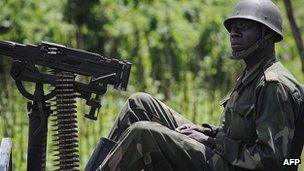Rwanda military aiding DRC mutiny, report says
- Published

New evidence has emerged that the Rwandan military is aiding rebels in the Democratic Republic of Congo, Human Rights Watch says.
The rights group says former rebels have described how Rwanda provided the rebellion with hundreds of recruits and also with weapons and ammunition.
Rwanda also offered shelter to renegade leader Bosco Ntaganda, wanted by the International Criminal Court, HRW says.
The Rwandan government has denied any involvement in April's mutiny.
Correspondents say the report does not go as far as explicitly accusing the government of approving support for the rebels, but calls on Kigali to ensure it is stopped.
The mutiny was led by fighters from Gen Ntaganda's former rebel group the CNDP, which was integrated into the Congolese national army in 2009 as part of a peace deal.
Over the weekend, the political wing of CNDP pulled out of a political alliance with Congolese President Joseph Kabila, which it joined as part of the 2009 peace process, and officially allied itself with the rebels - now known as M23.
"The M23 soldiers are our brothers," a spokesperson, Antoine Mahamba, told the BBC, adding that the group's provincial minister in North Kivu has resigned.
Cross-border training
Latest reports say the rebels are holed up on three hills close to the Rwandan border.
Last week, an internal UN report seen by the BBC also said there was evidence that the rebellion was being supported by neighbouring Rwanda.
The report cited defecting soldiers who said they had been trained in Rwanda under the pretext of joining the army, before being sent over the border to fight.
HRW now says the Rwandan military was directly involved in providing the rebels with between 200-300 men.
Former fighters told the group that Rwandan officers had given them heavy weapons and ammunition to carry to the Congolese positions of the M23 rebels, and that they saw Bosco Ntaganda meet an army official in Rwanda.
"The role played by some Rwandan military officials in supporting and harbouring an ICC war crimes suspect can't just be swept under the rug," HRW's senior Africa researcher, Anneke Van Woudenberg, said.
"Rwanda should immediately stop all support to Ntaganda and assist in his arrest," she added.
Rwandan Foreign Minister Louise Mushikiwabo has previously denied similar allegations.
In a statement in advance of the HRW report, she described the claims as "simplistic, irresponsible and dangerous".
General Ntaganda and M23 leaders have also rejected claims that they are involved with each other or with Rwanda.
The area has suffered years of fighting since 1994, when more than a million ethnic Hutus fled across the border into DR Congo following the Rwandan genocide, in which some 800,000 people, mostly Tutsis, were slaughtered.
Rwanda has twice invaded its much larger neighbour, saying it was trying to take action against Hutu rebels based in DR Congo.
Tens of thousands have fled the recent violence in the eastern DR Congo.
Known as the "Terminator", Gen Ntaganda has fought for various militias over the years and has told the BBC he has no involvement in the recent army mutiny.
The ICC prosecutor, who issued an arrest warrant for him in 2006, accuses him of recruiting child fighters in the north-eastern region of Ituri for the same rebel group as Thomas Lubanga, who in March became the first person to be convicted of war crimes by the court.